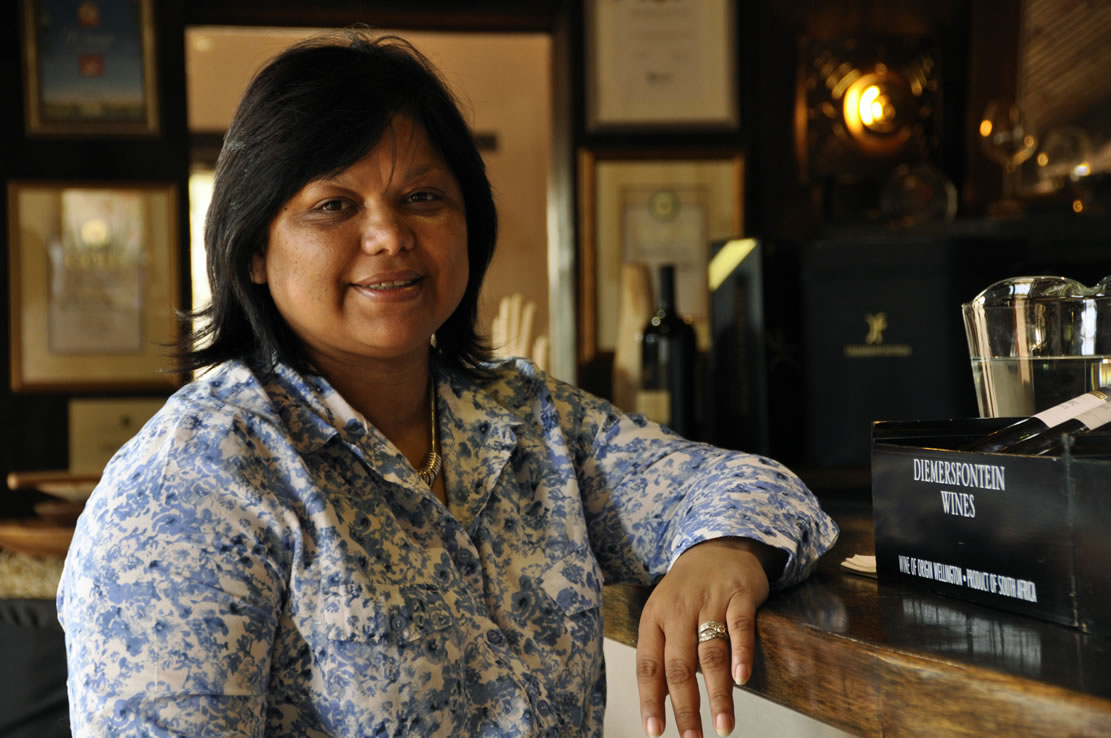Through Thokozani, Denise Stubbs is helping create a better future for farmworkers in the Western Cape, all while producing delicious award-winning wines.
In February 2019, Denise Stubbs was named among the world’s top female entrepreneurs in the 2019 Enterprising Women Awards. Winners must demonstrate that they run fast-growing businesses, that they mentor or actively support women and girls in entrepreneurship, and they must stand out as leaders in their communities. All of which Denise has demonstrated through her work as director and CEO of Thokozani, the Diemersfontein Wine empowerment initiative in which farm workers were given a share of the business. We chat to the successful entrepreneur about this inspiring project and how it is positively impacting the community.
What does Thokozani mean and how is it significant to the work you do?
Thokozani means ‘a celebration’, and it is in this spirit that our project was launched – with its central and crucial focus on training and development as an absolute necessity to the achievement of sustainable economic empowerment. At Diemersfontein Wine and Country Estate outside Wellington, BBBEE has flowed naturally from owner David Sonnenberg’s wish to make a sustainable community contribution. I joined the Sonnenberg family in 2001. To celebrate true empowerment is a reminder that ubuntu is real. Drinking Thokozani and sharing our story of transformation has proven that nothing is impossible!
Where did this idea come from and what did you set out to achieve?
I grew up running among the vines, as my parents were both labourers on the farms. As a little girl, I always saw the wine sector as the ‘Hollywood’ of the agriculture industry. I grew up in the era of the ‘dop system’, which is a notorious truck system that was used in South African wine farms – particularly in the Western Cape. Farm workers would receive payment in the form of money with a daily measure of cheap wine as a fringe benefit. This practice increased and exacerbated alcoholism among farm workers, which resulted in widespread social damage among communities. As such, I always wanted to give back to my community and help them understand the art of wine drinking and move away from the violence of the past. The business was launched in 2002 with the idea to change the industry for the better of our communities. The creation of Thokozani has changed attitudes on the farm. The number of staff shareholders has grown to 75 out of around 115 employees, and a new cohort will soon qualify. Workers are more willing to buy shares than at first and some even contribute 2% of their salaries each month. The workers now take great pride in the estate and are thinking more critically about its development.
Would you say you’ve achieved this goal?
I believe so. After almost 16 years on the farm and working intensely with the employees and shareholders, we have achieved so much. We built a wine brand named Thokozani over the years, which received a double platinum award at the Michelangelo Spirit and Wine Awards,not because of BBBEE but because we believe in quality and sustainability. We became the first empowerment wine producers to sign exclusivity with Woolworths National, and we are proud to be on their shelves for the past five years with our brand Ovation. We built a 16-bedroom four-star guest house over 10 years, and are in the process of settling our debt on our property. We now own 80% of our business and Diemersfontein 20%. I worked my way up with pure belief, tenacity and faith for a better future for my family and our shareholders. Becoming the majority shareholder and CEO of Thokozani, which is still majority white-owned and male-dominated, is a challenge that I believe was God’s plan for me long before I entered this industry.
How has Thokozani personally impacted your life?
Since the day the Sonnenbergs let me into their circles to change this industry, it hasn’t been easy. I sacrificed five years of salary increases and bonuses to prove my worth. For every successful year, I earned shares instead of cash, and today I am blessed to see that not only did I become the majority shareholder through sweat equity, but I opened up doors for the local community by training and empowering them to become solid leaders in leadership positions for both Thokozani and Diemersfontein. Thokozani made me grow into an independent, trailblazer of a women. I won numerous awards of which the latest was the 2019 International Enterprising Women of the Year Award winner in Florida USA. My story encouraged people to do better and over time I became a motivational speaker that was in demand.
Are there any success stories that have come out of Thokozani that you can share with us?
There’s so many! Cheslin Prins has gone from being a general worker to our Liaison Manager in hospitality; Tholine Liebenberg went from working in the vineyard to supervising it; Tamerin Crotz started as a receptionist and is now the hospitality manager and director of Thokozani. We also have Aubern Williams who was a tasting room assistant and is now our brand ambassador; Chantel Oransie who went from cleaner to export clerk; Jason Tiras from cellar worker to winemaker’s assistant; and myself, Denise Stubbs, who started out in HR and am now an executive on the Diemersfontein panel and CEO of Thokozani.
What were some of the challenges you faced along the way?
Not everyone embraces empowerment and transformation. Unfortunately, some purchase our products because of a social responsibility and not because they believe in our quality and our values. I was always judged as a woman and because this industry never belonged to our people. My approach was simple. Kill them with ‘wineness’… and make sure that I’m an example that others want to follow. Thokozani wines won many accolades but still the consumers did not embrace the name Thokozani. We started to export the brand and created a new brand Ovation, and sold this in the local market. We built the business without emotions, and focused on the end goal, which was to be sustainable and profitable. We opened our doors to tourists and locals for them to engage with our story of hope, and eventually people started to grow with our brand and promoted us as they would any other wine producer.
What are some of the highlights of your career?
Travelling the world in order to represent Thokozani and seeing transformation within the industry. Also being on the panel of the EU Trade Commissioner to discuss trade barriers for women-empowered businesses in the world; starting our Ovation Choir on the farm and helping them to share their love for singing; and winning numerous awards on local and international levels. And lastly, sharing this venture with my people who are my shareholders, and changing the lives of my colleagues and building a trust relationship of respect and growth.
Why do you think businesses and projects like Thokozani are so important?
To show people that it is possible. People feed from success stories, and I believe the truth and reality will encourage others to do more.
Words: Bianca Hartel | Images:
READ: Inverroche, Pioneers of the Present







